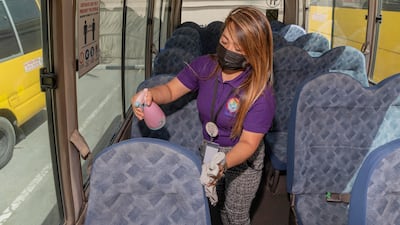A UAE-wide survey by a school in Dubai has found that good mental health support is a crucial factor for parents deciding where their children should be educated.
Head teachers said ensuring pupils received external psychological support could be challenging because it is often not covered by health insurance.
Many good schools in the UAE have staff trained in mental health first aid to deal with cases such as panic attacks.
Royal Grammar School Guildford Dubai
Royal Grammar School Guildford Dubai polled 250 parents of children aged between 3 and 11 in the UAE this year.
The survey found that more than seven in 10 questioned were worried about the psychological support that their child received at school and half of the parents wanted mental health to be on the curriculum as standard.
The poll revealed that more than seven in 10 parents said that their child’s mental health had deteriorated because of the pandemic, and the same number said that home-schooling had a negative impact on their own mental health.
Last year, close to 40 per cent of young people aged 18 to 24 in the Middle East felt their mental health had deteriorated, a global study found.
The Mental State of the World Report ascribed the trend to the Covid-19 pandemic with its repeated lockdowns, remote learning and long spells of enforced isolation.
“It is no surprise that parents are now looking to schools for mental health support for their children after the pandemic has caused disruption in their learning and social development,” said Clare Turnbull, principal at the Royal Grammar School Guildford Dubai.
“We have many trained members of staff within the school, whether it be teachers who have experience and knowledge on wellbeing, and on early mental health issues or teachers who are also additionally trained counsellors, so we can offer frontline support within school.
“After that, if it was something that we felt, in consultation with the parents, that a child would benefit from more additional specialist support, then we would help the parents find the right company. But that that would be at their cost.”
Mental health is also taught in the school’s curriculum.
Encouraging an honest conversation around mental health is a priority for the school, with pupils taught strategies to help them understand and process their feelings.
Educators believe the pandemic put a spotlight on children’s mental health when pupils were forced to study at home for extended periods of time.
David Cook, headmaster at Repton Dubai, in Nad Al Sheba, said there had been a shift in the mindset of parents in the past decade and they were now acutely aware of teenagers’ mental health needs.
During the pandemic, he said, many young people who left their homes and went to university were then locked in their bedrooms.
He said schools needed to assess whether they were giving pupils the necessary tools to help themselves.
Mr Cook said many schools now have a school counsellor and a trained child psychologist on staff. He said all three Repton schools had staff who were trained in mental health.
“Good schools around the world are employing specialists in teenage mental health,” said Mr Cook.
“We also have very extensive relationships now with specialists at centres of wellbeing, and we would regularly have a specialist come in and talk to a whole year group.”
A member of staff trained in mental health first aid or a pastoral leader or class teacher usually talks to pupils about different issues including anxiety, depression and body image.
“Those sessions are successful in 90 per cent of the cases. In 10 per cent of cases, which are very serious, then we have very good links with a centre of wellbeing, and in those particular cases we talk to parents, and refer youngsters to specialists,” said Mr Cook.
“But I'm afraid that then like any specialist, there will be there will be costs associated. But in my experience, most interventions by schools are successful in school.”
Shiny Davison, director of learning at Gulf Model School in Dubai, said the challenges were more severe for schools with the lowest fees, because many pupils’ parents could not afford help.
She said that when pupils needed specialist help, it could place a big financial burden on families.
The school has a five-member counselling team and members of staff able to administer mental health first aid.
Pupils can send send anonymous messages to the counsellors or seek individual help.
“The most important part is to offer wellbeing support. We have volunteers and parents who help the children out,” said Ms Davison.
“Volunteers may not be specialists but they can help the child out in the class. If they have a speech or a learning disability, volunteers can help.”
Radwa Allabban, Egyptian-British mother of three said that teenagers need a lot of emotional support and reassurance as they experience adolescence.
"The physical changes and changes of adult expectations of them can be really daunting if there isn’t strong parental guidance and also pastoral care in school,” said Ms Allabban.
"With the advances in technology and access to information in the age of influencers, instagrammers and celebrity gamers, there is certainly more pressure on teens to be 'successful' in these terms, which isn’t realistic in most cases.”
Ms Allabban did think that home schooling was a necessary evil during the pandemic, although it delivered many complications.
“My son asks me if the pandemic will ever be over. Isolation wasn’t good for his mental health,” she said.






















